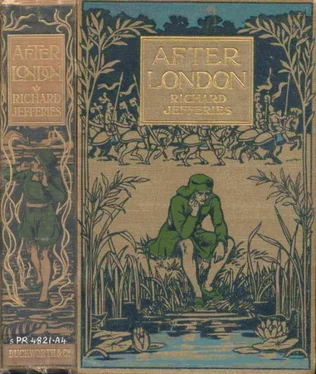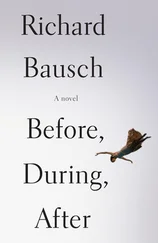Richard Jefferies - After London
Здесь есть возможность читать онлайн «Richard Jefferies - After London» весь текст электронной книги совершенно бесплатно (целиком полную версию без сокращений). В некоторых случаях можно слушать аудио, скачать через торрент в формате fb2 и присутствует краткое содержание. Город: London, Год выпуска: 1905, Издательство: Duckworth & Co., Жанр: sf_postapocalyptic, на английском языке. Описание произведения, (предисловие) а так же отзывы посетителей доступны на портале библиотеки ЛибКат.
- Название:After London
- Автор:
- Издательство:Duckworth & Co.
- Жанр:
- Год:1905
- Город:London
- ISBN:нет данных
- Рейтинг книги:4 / 5. Голосов: 1
-
Избранное:Добавить в избранное
- Отзывы:
-
Ваша оценка:
- 80
- 1
- 2
- 3
- 4
- 5
After London: краткое содержание, описание и аннотация
Предлагаем к чтению аннотацию, описание, краткое содержание или предисловие (зависит от того, что написал сам автор книги «After London»). Если вы не нашли необходимую информацию о книге — напишите в комментариях, мы постараемся отыскать её.
(1885), set in a future in which urban civilization has collapsed after an environmental crisis.” (From
).
This eBook is for the use of anyone anywhere at no cost and with almost no restrictions whatsoever. You may copy it, give it away or re-use it under the terms of the Project Gutenberg License included with this eBook or online at
* * *
After London — читать онлайн бесплатно полную книгу (весь текст) целиком
Ниже представлен текст книги, разбитый по страницам. Система сохранения места последней прочитанной страницы, позволяет с удобством читать онлайн бесплатно книгу «After London», без необходимости каждый раз заново искать на чём Вы остановились. Поставьте закладку, и сможете в любой момент перейти на страницу, на которой закончили чтение.
Интервал:
Закладка:
The tower he would build yonder, three-quarters of a mile, perhaps a mile, inland from the opposite shore, on a green knoll, at the base of which the brook flowed. It would be even more pleasant there than on the shore of the lake. The forest he would clear back a little, and put up a stout palisade, enclosing at least three miles of grassy land. By the shore of the lake he would build his town, so that his vessels might be able to go forth into the great Sweet Water sea. So strongly did imagination hold him that he did not observe how near it was to sunset, nor did he remark the threatening aspect of the sky. Thunder awoke him from his dream; he looked, and saw a storm rapidly coming from the north-east.
He descended the hill, and sheltered himself as well as possible among some thick fir-trees. After the lightning, the rain poured so heavily that it penetrated the branches, and he unstrung his bow and placed the string in his pocket, that it might not become wet. Instantly there was a whoop on either side, and two gipsies darted from the undergrowth towards him. While the terrible bow was bent they had followed him, tracking his footsteps; the moment he unstrung the bow, they rushed out. Felix crushed through between the firs, by main force getting through, but only opening a passage for them to follow. They could easily have thrust their darts through him, but their object was to take him alive, and gratify the revenge of the tribes with torture.
Felix doubled from the firs, and made towards the far-distant camp; but he was faced by three more gipsies. He turned again and made for the steep hill he had descended. With all his strength he raced up it; his lightness of foot carried him in advance, and he reached the summit a hundred yards ahead; but he knew he must be overtaken presently, unless he could hit upon some stratagem. In the instant that he paused to breathe on the summit a thought struck him. Like the wind he raced along the ridge, making for the great Sweet Water, the same path he had followed in the morning. Once on the ridge the five pursuers shouted; they knew they should have him now there were no more hills to breast. It was not so easy as they imagined.
Felix was in splendid training; he kept his lead, and even drew a little on them. Still he knew in time he must succumb, just as the stag, though swifter of foot, ultimately succumbs to the hounds. They would track him till they had him. If only he could gain enough to have time to string and bend his bow! But with all his efforts he could not get away more than the hundred yards, and that was not far enough. It could be traversed in ten seconds, they would have him before he could string it and fit an arrow. If only he had been fresh as in the morning! But he had had a long walk during the day and not much food. He knew that his burst of speed must soon slacken, but he had a stratagem yet.
Keeping along the ridge till he reached the place where the lake narrowed to the river, suddenly he rushed down the hill towards the water. The edge was encumbered with brushwood and fallen trees; he scrambled over and through anyhow; he tore a path through the bushes and plunged in. But his jacket caught in a branch; he had his knife out and cut off the shred of cloth. Then with the bow and knife in one hand he struck out for the opposite shore. His hope was that the gipsies, being horsemen, and passing all their lives on their horses, might not know how to swim. His conjecture was right; they stopped on the brink, and yelled their loudest. When he had passed the middle of the slow stream their rage rose to a shriek, startling a heron far down the water.
Felix reached the opposite shore in safety, but the bow-string was now wet and useless. He struck off at once straight across the grass-lands, past the oaks he had admired, past the green knoll where in imagination he had built his castle and brought Aurora, through the brook, which he found was larger than it appeared at a distance, and required two or three strokes to cross. A few more paces and the forest sheltered him. Under the trees he rested, and considered what course to pursue. The gipsies would expect him to endeavour to regain his friends, and would watch to cut off his return. Felix determined to make, instead, for another camp farther east, and to get even there by a detour.
Bitterly he reproached himself for his folly in leaving the camp, knowing that gipsies were about, with no other weapon than the bow. The knife at his belt was practically no weapon at all, useful only in the last extremity. Had he a short sword, or javelin, he would have faced the two gipsies who first sprang towards him. Worse than this was the folly of wandering without the least precaution into a territory at that time full of gipsies, who had every reason to desire his capture. If he had used the ordinary precautions of woodcraft, he would have noticed their traces, and he would not have exposed himself in full view on the ridges of the hills, where a man was visible for miles. If he perished through his carelessness, how bitter it would be! To lose Aurora by the merest folly would, indeed, be humiliating.
He braced himself to the journey before him, and set off at a good swinging hunter’s pace, as it is called, that is, a pace rather more than a walk and less than a run, with the limbs somewhat bent, and long springy steps. The forest was in the worst possible condition for movement; the rain had damped the fern and undergrowth, and every branch showered raindrops upon him. It was now past sunset and the dusk was increasing; this he welcomed as hiding him. He travelled on till nearly dawn, and then, turning to the right, swept round, and regained the line of the mountainous hills after sunrise. There he rested, and reached a camp about nine in the morning, having walked altogether since the preceding morning fully fifty miles. This camp was about fifteen miles distant from that of his friends; the shepherds knew him, and one of them started with the news of his safety. In the afternoon ten of his friends came over to see him, and to reproach him.
His weariness was so great that for three days he scarcely moved from the hut, during which time the weather was wet and stormy, as is often the case in summer after a thunderstorm. On the fourth morning it was fine, and Felix, now quite restored to his usual strength, went out with the shepherds. He found some of them engaged in throwing up a heap of stones, flint, and chalk lumps near an oak-tree in a plain at the foot of the hill. They told him that during the thunderstorm two cows and ten sheep had been killed there by lightning, which had scarcely injured the oak.
It was their custom to pile up a heap of stones wherever such an event occurred, to warn others from staying themselves, or allowing their sheep or cattle to stay, near the spot in thunder, as it was observed that where lightning struck once it was sure to strike again, sooner or later. “Then,” said Felix, “you may be sure there is water there!” He knew from his study of the knowledge of the ancients that lightning frequently leaped from trees or buildings to concealed water, but he had no intention of indicating water in that particular spot. He meant the remark in a general sense.
But the shepherds, ever desirous of water, and looking on Felix as a being of a different order to themselves, took his casual observation in its literal sense. They brought their tools and dug, and, as it chanced, found a copious spring. The water gushed forth and formed a streamlet. Upon this the whole tribe gathered, and they saluted Felix as one almost divine. It was in vain that he endeavoured to repel this homage, and to explain the reason of his remark, and that it was only in a general way that he intended it. Facts were too strong for him. They had heard his words, which they considered an inspiration, and there was the water. It was no use; there was the spring, the very thing they most wanted. Perforce Felix was invested with attributes beyond nature.
Читать дальшеИнтервал:
Закладка:
Похожие книги на «After London»
Представляем Вашему вниманию похожие книги на «After London» списком для выбора. Мы отобрали схожую по названию и смыслу литературу в надежде предоставить читателям больше вариантов отыскать новые, интересные, ещё непрочитанные произведения.
Обсуждение, отзывы о книге «After London» и просто собственные мнения читателей. Оставьте ваши комментарии, напишите, что Вы думаете о произведении, его смысле или главных героях. Укажите что конкретно понравилось, а что нет, и почему Вы так считаете.












